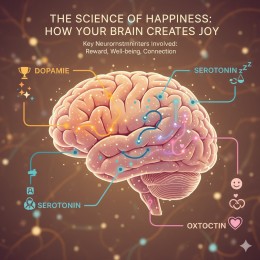
The Science of Happiness: How Your Brain Creates Joy
2025-10-18 13:37:24What truly makes us happy?
Is it success, love, money, or something deeper that lives inside our brain?
Happiness has fascinated scientists, psychologists, and philosophers for centuries - yet, modern neuroscience is finally uncovering what really goes on behind those moments of joy.
Happiness isn't just an emotion - it's a biochemical process, a harmony of brain chemicals, thoughts, and behaviours that shape how we experience life. At CIIMHANS (Central India Institute of Mental Health and Neuro Sciences), we believe understanding the science behind happiness is the first step to cultivating long-term emotional well-being.
The Brain Chemistry of Happiness
Your feelings of happiness, calm, or motivation are not random. They're guided by four key neurotransmitters - the brain's happy chemicals:
1. Dopamine -The Reward Chemical
Dopamine is released when you achieve a goal or complete a task - whether it's finishing a workout, ticking off your to-do list, or receiving appreciation.
It gives you that satisfying sense of accomplishment and motivation to keep going.
How to Boost It Naturally:
Set small, achievable goals daily.
Celebrate progress, not just results.
Avoid over-reliance on instant dopamine (like scrolling or gaming).
2. Serotonin - The Mood Stabilizer
Serotonin promotes a sense of calm, confidence, and contentment. Low levels of serotonin are linked with depression, anxiety, and mood swings.
Sunlight, positive social connections, and healthy eating play a big role in keeping it balanced.
How to Boost It Naturally:
Spend 15-20 minutes in sunlight.
Practice gratitude journaling.
Include tryptophan-rich foods like bananas, nuts, and eggs in your diet.
3. Endorphins - The Natural Painkillers
Endorphins are released during exercise, laughter, or even crying - helping relieve stress and reduce physical or emotional pain.
How to Boost It Naturally:
Engage in physical activity (even a short walk helps).
Watch something funny.
Practice deep breathing or meditation.
4. Oxytocin - The Love Hormone
Oxytocin strengthens bonds, trust, and social connection. It's often released during acts of kindness, affection, or meaningful communication.
How to Boost It Naturally:
Hug a loved one or pet.
Volunteer or do something kind for others.
Foster healthy relationships and emotional intimacy.
The Psychology of Happiness
True happiness isn't just chemical - it's also psychological. Your thoughts, mindset, and habits shape how your brain interprets experiences.
The Hedonic Treadmill
Our brains adapt quickly - what excites us today may become "normal" tomorrow. This is why chasing possessions or external success rarely sustains happiness.
Instead, meaningful relationships, purpose, and growth bring lasting satisfaction.
Positive Thinking & Neuroplasticity
Science shows that the brain can rewire itself through repeated thoughts - a concept known as neuroplasticity. Practicing optimism or mindfulness literally strengthens neural pathways linked to joy and calmness.
Habits That Train Your Brain for Joy
You can actually teach your brain to feel happier over time.
Here are some evidence-based daily practices that help:
Gratitude Journaling:
Writing three things you're thankful for each day rewires your brain for positivity.Mindfulness Meditation:
Being present in the moment reduces stress and improves emotional regulation.Acts of Kindness:
Helping others boosts oxytocin and serotonin levels.Balanced Sleep & Nutrition:
Sleep deprivation lowers dopamine and serotonin - both essential for emotional balance.Digital Boundaries:
Too much screen time overstimulates dopamine. Limit notifications and prioritize real-life interactions.
Cultural and Social Aspects of Happiness
In India and across the world, happiness is deeply tied to community, spirituality, and belonging.
Studies show that people who maintain social connections, family support, and spiritual grounding often report better mental well-being.
At CIIMHANS, we encourage holistic mental health care - combining medical, psychological, and social support to nurture emotional resilience.
When Happiness Feels Out of Reach
If you find it difficult to feel joy even after trying lifestyle changes, it might be a sign of an underlying condition like depression, anxiety, or burnout.
Remember - it's okay to ask for help.
Professional counselling and therapy can help identify thought patterns or stressors that are blocking your sense of fulfilment.
At CIIMHANS, our team of psychiatrists, psychologists, and therapists specialize in:
Stress and anxiety management
Depression and mood disorder treatment
Mindfulness-based therapy
Emotional and behavioural counselling
Conclusion: Happiness is a Skill You Can Build
Happiness is not a constant state - it's a skill that requires awareness, patience, and care.
By understanding how your brain creates joy and nurturing it daily through mindfulness, connection, and self-care, you can build a stronger, more balanced mind.
At CIIMHANS, we're here to help you rediscover that joy - not as a fleeting emotion, but as a sustainable way of living.
CIIMHANS - Central India Institute of Mental Health & Neuro Sciences
Your Partner in Mental Wellness
Location: Raipur, Chhattisgarh
Website: www.ciimhans.com
Email: info@ciimhans.com
